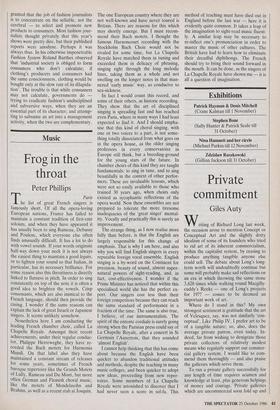Music
Frog in the throat
Peter Phillips
TParis he list of great French singers is famously short. Of all the opera-loving European nations, France has failed to maintain a constant tradition of first-rate soloists, and when they have appeared it has usually been to sing Rameau, Debussy and Poulenc, which everyone else often finds unusually difficult. It has a lot to do with vowel sounds. If your words originate half-way down your neck it is not always the easiest thing to maintain a good legato, or to lighten your sound so that Italian, in particular, has its necessary brilliance. For some reason also this throatiness is directly linked to flatness in pitch. In order to sing consistently on top of the note it is often a good idea to brighten the vowels. Crisp consonants, which are also inimical to the French language, should then provide the easing. I wonder if the same reasons can explain the lack of great Israeli or Japanese singers. It seems unlikely somehow.
Nonetheless here I am conducting the leading French chamber choir, called La Chapelle Royale. Amongst their recent achievements, under their regular conduc- tor, Philippe Herreweghe, they have re- corded the Bach motets for Harmonia Mundi. On that label also they have maintained a constant stream of releases for some years, sometimes of French baroque repertoire like the Grands Motets of Luny. Rameau and Du Mont, but more often German and Flemish choral music, like the motets of Mendelssohn and 13rahms, as well as a recent stab at Josquin.
The one European country where they are not well-known and have never toured is Britain. There are reasons for this which may shortly emerge. But I must recom- mend their Bach motets. I thought the famous Harnoncourt recording with the Stockholm Bach Choir would not be rivaled for some time, but La Chapelle Royale have matched them in tuning and exceeded them in delicacy of phrasing, singing right through the long melodic lines, taking them as a whole and not swelling on the longer notes in that man- nered 'early music' way, so conducive to sea-sickness.
In fact I would count this record, and some of their others, as historic recording. They show that the art of disciplined singing is spreading fast and has reached even Paris, where in many ways I had least expected to find it. And I should empha- sise that this kind of choral singing, with one or two voices to a part, is not some- thing totally dissociated from what goes on in the opera house, as the older singing professors in every conservatoire in Europe still think, but a breeding-ground for the young stars of the future. In chamber choirs of this kind they are taught fundamentals: to sing in tune, and to sing beautifully in the context of other perfor- mers. These are invaluable lessons, which were not so easily available to those who trained 30 years ago, when choirs only existed as sycophantic reflections of the opera world. Now these ensembles are not prepared to tolerate the more tiresome inadequacies of the 'great singer' mental- ity. Vocally and practically this is surely an improvement.
The strange thing, as I now realise more fully than before, is that the English are largely responsible for this change of emphasis. That is why I am here, and also why you will find English singers in every reputable foreign vocal ensemble. English singing is a by-word on the Continent for precision, beauty of sound, almost super- natural powers of sight-reading, and, in fact, cost-effectiveness. I wonder if the Prime Minister has noticed that within this specialised world she has the perfect ex- port. Our singers cost less than their foreign competitors because they can reach the same standard of performance in a fraction of the time. The same is also true, I believe, of our instrumentalists. The spirit of the entente cordiale is surely going strong when the Parisian press could say of La Chapelle Royale, after a concert in St Germain l'Auxerrois, that they sounded 'almost English'.
I cannot help thinking that this has come about because the English have been quicker to abandon traditional attitudes and methods, despite the teaching in many music colleges, and been quicker to adopt new ideas, proceeding from new reper- toires. Some members of La Chapelle Royale were astonished to discover that I had never seen a score in sol-fa. This method of teaching must have died out in England before the last war — here it is evidently quite common. It takes a leap of the imagination to sight-read music fluent- ly. A similar leap may be necessary to re-inflect one's pronunciation in order to master the music of other cultures. The British have had to learn how to eliminate their dreadful diphthongs. The French should try to bring their sound forward in the mouth. It can be done, as the singers of La Chapelle Royale have shown me — it is all a question of imagination.


























































 Previous page
Previous page